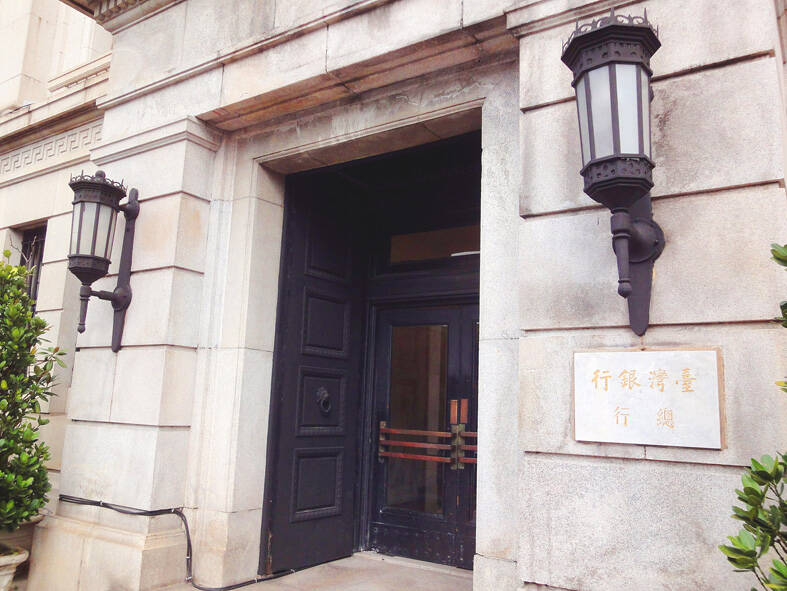Bank of Taiwan (台灣銀行), the largest lender in the country, is to raise the benchmark one-year time savings deposit rate to a 15-year-high 1.715 percent from tomorrow following a surprise central bank rate hike.
The increase reflected a 12.5 basis-point key interest rate increase instituted by the central bank on Friday, Bank of Taiwan said.
The state-owned lender is also to raise its two-year time savings deposit rate and three-year time savings deposit rate by 0.125 percentage points to 1.750 percent and 1.785 percent respectively.

Photo: Lu Kuan-cheng, Taipei Times
Under the new rates, one-year time savings depositors who have NT$1 million (US$31,291) in their accounts would receive more than NT$17,280 in annual interest payments, up from NT$16,020, based on compound-rate calculations, Bank of Taiwan said.
On Thursday, the central bank said it would raise key interest rates the next day in light of higher Taiwan Power Co (台電) electricity rates effective from April 1.
After the central bank’s latest rate hike, Taiwan’s benchmark discount rate has increased to 2 percent.
The central bank said it has revised consumer price index growth to 2.16 percent for this year, above the 2 percent alert level it set as well as an earlier 1.89 percent forecast in December last year, prompting it to raise rates for the first time since March 2022.
The central bank’s decision came as a surprise after the US Federal Reserve on Wednesday left interest rates unchanged.
With the changes, Taiwan’s rate on accommodations with collateral has risen to 2.375 percent, while accommodations without collateral increased to 4.25 percent, the central bank said.
From March 2022 to March last year, the central bank raised interest rates 75 basis points, which led Bank of Taiwan’s one-year time savings deposit rate to increase to 1.59 percent from 0.84 percent.
Bank of Taiwan had also increased interest payments on deposits of NT$1 million to almost NT$16,020 from about NT$8,340 a year, based on compound rate calculations, during the same period.

CALL FOR SUPPORT: President William Lai called on lawmakers across party lines to ensure the livelihood of Taiwanese and that national security is protected President William Lai (賴清德) yesterday called for bipartisan support for Taiwan’s investment in self-defense capabilities at the christening and launch of two coast guard vessels at CSBC Corp, Taiwan’s (台灣國際造船) shipyard in Kaohsiung. The Taipei (台北) is the fourth and final ship of the Chiayi-class offshore patrol vessels, and the Siraya (西拉雅) is the Coast Guard Administration’s (CGA) first-ever ocean patrol vessel, the government said. The Taipei is the fourth and final ship of the Chiayi-class offshore patrol vessels with a displacement of about 4,000 tonnes, Lai said. This ship class was ordered as a result of former president Tsai Ing-wen’s (蔡英文) 2018

‘SECRETS’: While saying China would not attack during his presidency, Donald Trump declined to say how Washington would respond if Beijing were to take military action US President Donald Trump said that China would not take military action against Taiwan while he is president, as the Chinese leaders “know the consequences.” Trump made the statement during an interview on CBS’ 60 Minutes program that aired on Sunday, a few days after his meeting with Chinese President Xi Jinping (習近平) in South Korea. “He [Xi] has openly said, and his people have openly said at meetings, ‘we would never do anything while President Trump is president,’ because they know the consequences,” Trump said in the interview. However, he repeatedly declined to say exactly how Washington would respond in

WARFARE: All sectors of society should recognize, unite, and collectively resist and condemn Beijing’s cross-border suppression, MAC Minister Chiu Chui-cheng said The number of Taiwanese detained because of legal affairs by Chinese authorities has tripled this year, as Beijing intensified its intimidation and division of Taiwanese by combining lawfare and cognitive warfare, the Mainland Affairs Council (MAC) said yesterday. MAC Minister Chiu Chui-cheng (邱垂正) made the statement in response to questions by Democratic Progressive Party (DPP) Legislator Puma Shen (沈柏洋) about the government’s response to counter Chinese public opinion warfare, lawfare and psychological warfare. Shen said he is also being investigated by China for promoting “Taiwanese independence.” He was referring to a report published on Tuesday last week by China’s state-run Xinhua news agency,

‘ADDITIONAL CONDITION’: Taiwan will work with like-minded countries to protect its right to participate in next year’s meeting, the foreign ministry said The US will “continue to press China for security arrangements and protocols that safeguard all participants when attending APEC meetings in China,” a US Department of State spokesperson said yesterday, after Beijing suggested that members must adhere to its “one China principle” to participate. “The United States insists on the full and equal participation of all APEC member economies — including Taiwan — consistent with APEC’s guidelines, rules and established practice, as affirmed by China in its offer to host in 2026,” the unnamed spokesperson said in response to media queries about China putting a “one China” principle condition on Taiwan’s